Friday, September 29, 2006
The Manchester Conference: what a relief for Labour!
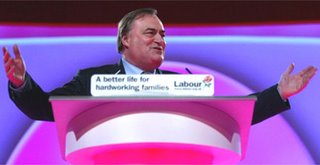 On 5th September last, Labour Party managers would have given anything for the conference they have just had. On that day, recall, an attempt to topple the prime minister had been made, apparently with tacit support from his oldest rival and the party stood poised on the brink of an abyss which could have plunged them into a decade of opposition. Following that Blair promised to go within a year, though without being too precise, and Brown appeared discreetly to move his tanks off Tony's lawn and back behind the flower beds. Even so the atmosphere was febrile and many expected some kind of blood to be smearing the G-Mex floor by the end of this week. That there was no blood is a sign that Labour has grown up just a little since the early eighties and, perhaps, that purely personality disputes are less harmful than those spiked with antithetical ideologies. Personally, I didn't think the party had shown the 'death wish' discerned by Polly Toynbee this morning.
On 5th September last, Labour Party managers would have given anything for the conference they have just had. On that day, recall, an attempt to topple the prime minister had been made, apparently with tacit support from his oldest rival and the party stood poised on the brink of an abyss which could have plunged them into a decade of opposition. Following that Blair promised to go within a year, though without being too precise, and Brown appeared discreetly to move his tanks off Tony's lawn and back behind the flower beds. Even so the atmosphere was febrile and many expected some kind of blood to be smearing the G-Mex floor by the end of this week. That there was no blood is a sign that Labour has grown up just a little since the early eighties and, perhaps, that purely personality disputes are less harmful than those spiked with antithetical ideologies. Personally, I didn't think the party had shown the 'death wish' discerned by Polly Toynbee this morning. Instead we had a number of quite good things upon which to reflect. Firstly, Gordon Brown's speech was not cut from the same dull David Davis cloth of last year which some had predicted. He failed to raise many heartbeats but he implicitly made his case to the party and wider movement that his competence and achievements had earned him the premiership. He also made an effort to convince us that he has learned a little magnamimity as well as the need to look outside his own circle for the talent to staff any new administration he might one day lead.
Secondly Blair, the old master, turned it on again and did manage to make the blood run more quickly. With this bravura performance he emphasised to delegates just how vital he has been to their party since he became leader in 1994. Large sections still want him to go but he has reminded them how big a hole he will leave once he has stepped down. I suspect he will have stilled much of the noisy discontent which characterized the late summer and might even be able to strtech his tenure by a few more months than commonly predicted.
Thirdly the supporting acts were good too: Bill Clinton weighed in with his guest speech to underline just how major a figure Blair has been; John Prescott won a fond farewell after apologizing for his Clintonian misdeeds but I just hope his apology to his wife was a bit more fulsome and and explicit than his cursory 'sorry' to the conference; and then we had John Reid, making his bid for leading the possible candidates to Gordon. On Reid's candidature I have written before and tend now to agree with Toynbee that the Newsnight focus group led by Frank Luntz should not be taken too seriously. Reid was shown favourably, making a strong verbal showing while the others' clips showed them being mostly mediocre.
But while Johnson has faded and Miliband is no longer even talked about, Reid is the one candidate who could come though to deny Gordon the premiership. Much depends on what happens between now and May but if terrorism becomes even more of a threat by then Reid's brand of tough-guy in your face Mohammed attitude might just come to challenge a man whose CV still makes him odds-on to lift the crown.
Wednesday, September 27, 2006
Political Blogging: where it's at
 On 24th September,last Sunday, I was invited to be part of a panel on political blogging under the very general aegis of the Labour Party Conference Fringe. The convenor of the meeting, held at urbis in Manchester, was the splendid Kate Feld, who blogs under 'Manchizzle' and has done much to help articulate a sense of community among bloggers up here in Manchester.
On 24th September,last Sunday, I was invited to be part of a panel on political blogging under the very general aegis of the Labour Party Conference Fringe. The convenor of the meeting, held at urbis in Manchester, was the splendid Kate Feld, who blogs under 'Manchizzle' and has done much to help articulate a sense of community among bloggers up here in Manchester.Also on the panel was the indefatigible pioneer now veteran blogger, Norman Geras, a former colleague from Manchester University and fellow cricket fanatic. Also present were a number of local bloggers including Stephen Newton and Roy Johnson of the arts blog, Mantex. The thrust of the debate/discusion was how well this new element of political communication was doing in relation to the mainstream media. I tried to chip in with my views on this throughout the session but if I summed them up it would come out as follows.
Political blogging has only been going for less than a decade but has already burgeoned astonishingly with hundreds of us busily projecting our thoughts into cyberspace. It seems to have captured a fair slice of the modern passion for 'interactivity' which we see in many aspects of the media whether in print journalism, radio or television. In the USA blogs have developed faster and further than in the UK so far, exerting something like a significant influence on the last presidential election. Over here we have recently had a guide drawn up by Iain Dale analysing the 400 or so political blogs currently running. Of these Dale's own and Guido Fawkes are by far the most popular with the latter - witty, irreverent and shamelessly gossipy- claiming the biggest number of daily hits and the former- also witty and informative and the work of a former author, publisher and Conservative candidate- perhaps filling the 'middle tabloid' part of the spectrum to Guido's more abrasive, populist version.
But have the bloggers usurped the mainstream media to any great extent?
I don't think so, as yet for the following reasons:
* we still deal pretty much with comment and opinion - this is very important function in helping form the climate of opinion in which polivcies are made. I was also intrigued to hear Peter Riddell of The Times, tell me recently at the Politics Association Conference, that he spends at least half an hour a day checking out the blogs as another important way of checking the nation's political pulse.
* we don't report or investigate, though maybe soon some bigger blogs might start doing this, if they can somehow attract the resources.
* so far blogs only influence politics at the fringes, breaking stories usually of a scandalous or gossipy nature, not really anything major. But Norm has shown with his Euston Manfesto that the blogo-sphere can create influential new coalitions of opinion- on this occasion on the intellectual left - which can extert a wide influence.
* the logistics of blog reading are still important. At the moment, reading blogs is mostly an uncomfortable business of scrolling down our PCs; not lounging on the sofa or sitting on the train, reading our favourite newspapers.
So blogging is still in its infancy - but it is developing at quite a lick and is an exciting part of modern political communication. I reckon it will have arrived when a major leak from a government department is not made to a major newspaper or broadcaster but to a political blogger.
How far away is that? In my view, certainly less than a another decade.
Tuesday, September 26, 2006
Luntz Puts Reid in the Frame

I was quite astonished by the onscreen focus group of Labour voters conducted by Frank Luntz, the US pollster last night. He assembled the chief likely candidates for the Labour leadership for consideration, finding Gordon with the most voter recognition; while Alan Johnson did not register on that count; John Reid, did, quite well. Then he fed his group written accounts of candidates' lives and careers from which Johnson emerged with some distinction. Then he played them recordings of speeches/interviews and Reid again came out of it surprisingly well with Johnson now nowhere. Afterall these influences were put topgether Luntz called for an overall assessment.
I thought Gordon would anyway emerge as the obvious choice- who, after all has done more for this government over the past nine years?- but Frank was first met with no arms for Brown whatsoever. After some remonstrating a couple of arms went up; a few for Johnson, none for Miliband but the majority came storming out for the ex heavy drinker, smoker and communist with an even more recognisable Scottish accent than Brown: John Reid. As I remerked during the August 'planes' crisis Reid clearly enjoys being in charge and thinks he can do the top job.
How much does all this mean? Well, it might mean that the moment has passed for Gordon. It's maybe eight months before a vote is likely and much can happen in the meantime, but Reid appears to be the best placed candidate to dash Brown's dreams. Given their history of mutual dislike, the toughguy Reid, won't mind that. What is even clearer is that Gordon desperately needs the imprimatur of a Blair endorsement. I just wonder if Tony will make him crawl a bit for that...?
Sunday, September 24, 2006
After Tony
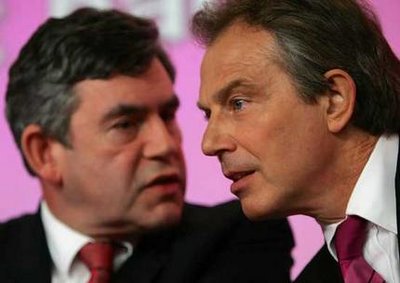 The Sundays don't offer much cheer for Brownites with Henry Porter predicting a 'bleak' future under the Scot and a slew of poll results in Friday's Guardian showing him a poor second to Cameron on most questions asked including a crunching 52-17 result on 'likeability'. But, assuming he gets in, even by a squeak, who will do what? That eminent interpreter of the political game, Peter Riddell came to our Politics Association yesterday and during questions suggested the following might well transpire:
The Sundays don't offer much cheer for Brownites with Henry Porter predicting a 'bleak' future under the Scot and a slew of poll results in Friday's Guardian showing him a poor second to Cameron on most questions asked including a crunching 52-17 result on 'likeability'. But, assuming he gets in, even by a squeak, who will do what? That eminent interpreter of the political game, Peter Riddell came to our Politics Association yesterday and during questions suggested the following might well transpire:Big Jobs
Darling (probably as Chancellor)
Johnson ( assuming he wins, Deputy Leader but if not, not)
Straw (possibly another candidate for Deputy Prime Minister)
Cabinet Jobs
Hewitt (seen as competent)
Miliband (possible Foreign Secretary)
Charles Clarke(maybe back in as sign Brown does not bear grudges-he does)
Reid (seen as tough and competent- better in the tent than... etc)
Hoon (well established Brownite who lost out at last reshuffle and ended up with a junior job- he'd like DCA)
Hilary Benn (maybe even another candidate for Deputy PM)
Losers
Beckett (too long in the tooth- in both senses)
Hain(not a Gordon favourite)
Hutton (who seems engaged on a 'kamikaze mission' from recent statements.)
Harmon, Byers and Milburn 'no chance'.
I wondered about Clare Short- maybe she'd reconsider her intention not to stand next election if given a job? And Nick Brown, perennial Brownite and not unpopular despite his monotone style. Well, we'll return to this when Gordon announces his first Cabinet; but we understand, from inside info, that Tony will not not do a 'Maggie' and try to be a 'backseat driver'. Gordon just wants to winkle him out of the driver's seat before worrying especially about that one though.
Saturday, September 23, 2006
Why do people want to get into a place no one trusts?
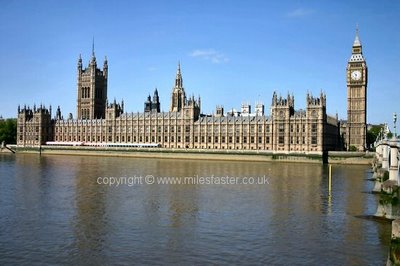 I've been at the annual conference of the Poltics Association since yesterday and today we've been taking the temperature of the body politic. Andrew Russel from Manchester University did a tip-top session on the decline of political parties which drew on the findings of Pattie et al in their Citizenship that on a 'trust' scale of 1-10 'government' managed only 3.7; House of Commons 3.9; and politicians in general a miserable 3.3. Next up was Phil Cowley from Nottingham University who was equally good in proving how vibrant parliament currently is.
I've been at the annual conference of the Poltics Association since yesterday and today we've been taking the temperature of the body politic. Andrew Russel from Manchester University did a tip-top session on the decline of political parties which drew on the findings of Pattie et al in their Citizenship that on a 'trust' scale of 1-10 'government' managed only 3.7; House of Commons 3.9; and politicians in general a miserable 3.3. Next up was Phil Cowley from Nottingham University who was equally good in proving how vibrant parliament currently is. But here's a thing. Phil told us of a woman, desperate to get selected in a Welsh constituency, who spent £5000 travelling every week to the land of my fathers only to not get selected anyway. Now, if so many people think politicians not to mention the Commons are so little trusted, then how come so many people are still so mad crazy to get elected to become reviled politicians sitting in the reviled House of Commons? I think I know the answer. Whilst politics leaves most people cold, a minority, a very small one I suspect, are obsessed by it.
You know the sort, like William Hague who used to read Hansard with a torch under the sheets in bed(why didn't he read mucky books like all the rest of us?), or indeed the sort of peopple who write political blogs. Politics has become the minority interest of a (sad?) little bunch of obsessives who actually care about the activity. Quite why politics is seen as so boring I just do not know; neither do I know why our institutions are so distrusted or our politicos so loathed. All I can say is thank the Lord, for the health of democracy, that at least some people are prepared to get elected and to try and make the sytem work. We'd a lot worse off without it.
Friday, September 22, 2006
Ming Makes the Grade
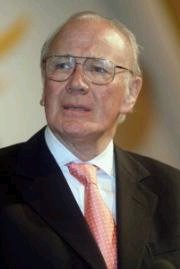 I'm pleased Ming managed to cut it with his conference speech. Earlier in the week strains with Charles Kennedy, his bibulous predecessor, showed when a possible symbolic handshake was vetoed, apparently by Kennedy himself. It will take a little longer for the two Scots to make their peace. Then there was the 'young lovelies' photoshot on the beach which merely sharpened up the impression of Ming's appearance as someone who has aged rather faster than one might expect of a former Olympic athlete. So he had some ground to make up.
I'm pleased Ming managed to cut it with his conference speech. Earlier in the week strains with Charles Kennedy, his bibulous predecessor, showed when a possible symbolic handshake was vetoed, apparently by Kennedy himself. It will take a little longer for the two Scots to make their peace. Then there was the 'young lovelies' photoshot on the beach which merely sharpened up the impression of Ming's appearance as someone who has aged rather faster than one might expect of a former Olympic athlete. So he had some ground to make up.Simon Hoggart has sone fun at Ming's expense today. 'Ming the Movie' was a mistake as any video presentation in such situations tend to be; I recall Ronld Reagan doing something similar at one of the Republican conventions and I thought it bombed (mind you the audience didn't think so- maybe that's part of the difference between 'us' and 'them'). But, as Hoggart points out, the audience here were desperate to love what Ming did- not as in IDS's choreographed shocker in 2004 but in a more responsible and convincing way. His jokes were dire, but as his his platitudes began to hit the spot for delegates, they began to give him that visceral, gut roar that is evidence an audience really like what they are getting. By the end everything he said was received with joyful acclaim- though I thought his words on improving public services would have to be vastly improved if votes and not cheers were the object.
He had probably had coaching in speaking to big audiences as I thought his hand movements were more convincing than hitherto; though Hoggart's suggestion that the raised arms in the air gesture at the end reminded him of 'the weekly class in an old folk's home' was, while witty, a bit unjustified. As the roar rose I was waiting for the rallying cry of David Steel to 'go back to your constituencies and prepare for government' but instead we got the more realistic vision of directing the party 'towards government'. But Ming made it; the dangerous rapids of the conference successfully navigated. He'll make it now until the next election but I imagine Nick Clegg is already mentally drafting his first conference speech as party leader. It can't be that far away.
Thursday, September 21, 2006
We'll probably Sign up for Trident even though we don't need it
 The question of whether Britain should acquire nuclear weapons was not formally discussed in Cabinet; Attlee just decided, with advisers, that on commonsense grounds, it was just the kind of weapon a country like Britain needed. Since then we have been stuck with them and their spiralling costs. We had the our veryown Blue Streak missile in the fifties, eventually cancelled for taking too long to fuel up and being too vulnerable to a possible first strike. Then we invested hope in the US Sky-Bolt project which would have complemented our air strike ability but that was rendered obsolete by US submarine launched Polaris missiles so we were persuaded to buy into those instead. Things went quiet for a while until Trident came on stream as the more modern version and so we bought into that as well.
The question of whether Britain should acquire nuclear weapons was not formally discussed in Cabinet; Attlee just decided, with advisers, that on commonsense grounds, it was just the kind of weapon a country like Britain needed. Since then we have been stuck with them and their spiralling costs. We had the our veryown Blue Streak missile in the fifties, eventually cancelled for taking too long to fuel up and being too vulnerable to a possible first strike. Then we invested hope in the US Sky-Bolt project which would have complemented our air strike ability but that was rendered obsolete by US submarine launched Polaris missiles so we were persuaded to buy into those instead. Things went quiet for a while until Trident came on stream as the more modern version and so we bought into that as well.Now we're up to the modernized version of Trident itself and as a result of assiduous and importunate researching by the Lib Dems we learn that total costs, including annual running costs, will exceed the expected £25bn by twice as much again over a 30 year period. Critics question why we need such a weapons system when: its raison d'etre, the USSR, no longer exists; we could not use it in any case without US agreement; and this is not a measure designed to encourage other nations to eschew the tempting option of developing nuclear weapons.
However, in his Mansion House speech in June Gordon Brown indicated-but only in an aside, not in the body of his speech- that he favoured renewal. There is to be no debate, if the government under Blair or Brown, can help it. The reasons for this are that: being nuclear is seen as a demonstrating virility internationally; buying Trident keeps us fast with the good old USA; and it's seen as providing a last ditch insurance policy in case some newly nuclear nation tries to intimidate us. In other words, the original reason why Attlee acquired them still obtains, in defiance of reason it seems to me. But Labour leaders may not have it all their own way at the coming Manchester conference. Nuclear weaponry is still an emotive issue within the Labour Party and on 5th September Charles Clarke demanded that such issues should be debated properly within the party and not dealt with merely by leadership fiat.
Wednesday, September 20, 2006
Why No British Grey Panthers?
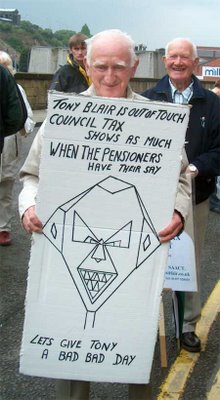 I saw recently that a party named the Grey Panthers, won nearly 4 per cent of the vote in the Mecklemburg-Vorpommern regional elections on 17th September. Another point and the wrinklies would have won seats. I also note the Guardian today doubts if the Lib Dems will convince voters, rather than party conference delegates, that pensions should be more heavily taxed. I'm sure that is right as there are 16 per cent over 65s in the UK and their turnout figures are more than double those of 18-24 year olds.
I saw recently that a party named the Grey Panthers, won nearly 4 per cent of the vote in the Mecklemburg-Vorpommern regional elections on 17th September. Another point and the wrinklies would have won seats. I also note the Guardian today doubts if the Lib Dems will convince voters, rather than party conference delegates, that pensions should be more heavily taxed. I'm sure that is right as there are 16 per cent over 65s in the UK and their turnout figures are more than double those of 18-24 year olds. But what surprises me is that the older vote is so poorly organized in Britain; no Grey Panthers over here. In the USA where 12 per cent are over 65 there is a national body which campaigns for the rights of older people. As I advance inexorably into these same ranks, I'm wondering why we don't do something similar.
There's the National Pensioners' Convention led for years by redoubtable trade-unionist, the 90 year old Jack Jones but which has succeeded only in being patronised by successive governments. And there's Age Concern of course, but that creaky institution is hardly comparable with the level of organization offered in the USA or indeed Mecklemburg-Vorpommern. Wrinkly power is yet to achieve self awareness and to flex its muscles but as our society continues to age-by 2025 one third of us will be over 55- this is a crucial sector of the electorate whose reliable votes are there to be won by the highest or most persuasive bidder.
Tuesday, September 19, 2006
Climate Change Deniers Exposed
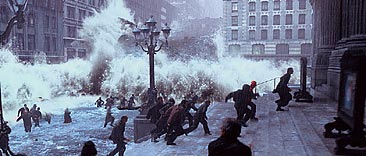 The picture shows a Hollywood image of what might happen should sea levels rise as exponentially as some climate scientists predict. A truly terrifying prospect but what worries me just as much is the persistence of the 'deniers' who insist gloabl warming is all some kind of con. The article(based on a new book) by George Monbiot, in today's Guardian supplement sheds some light on the life support systems of this determined and malign band of people.
The picture shows a Hollywood image of what might happen should sea levels rise as exponentially as some climate scientists predict. A truly terrifying prospect but what worries me just as much is the persistence of the 'deniers' who insist gloabl warming is all some kind of con. The article(based on a new book) by George Monbiot, in today's Guardian supplement sheds some light on the life support systems of this determined and malign band of people. I suppose one should not be so surprised at the success of the lobbyists who have endeavoured to spike the guns of those urging action. After all, the latter are seeking to wean the world off things to which they have become addicted: cheap comfortable car and air travel and a general uncaring prodigality about consumption. All the former have to do is to sow the seed of doubt in the minds of a jury which is very keen to stay out. They hope they can acquit themselves of complicity in the destruction of the world in which their children and children's children must try to make lives for themselves. It's rather like saying to a hopless alcoholic that they are not addicted and do not need treatment: they yearn desperately to believe such sophistries. I was astonished recently to hear Nigel Lawson, Mrs T's former 'brilliant' Chancellor, express the whole climate change denier thesis with apparent total conviction [which he has, incidentally expressed elsewhere in Prospect magazine.]
Monbiot explains how ExxonMobil, the world's most prfitable corporation, funds a number of agencies avidly seeding and reinforcing the doubt we are so keen to be justified in feeling. He also reveals that the PR firm-ACPO- hired to fight global warming scientists was the same one used by Philip Morris to rebut US Government concerns about passive smoking. ACPO set up a fake 'grass-roots' body The Advancement of Sound Science Coalition (TASSC) which has extended its remit to include global warming. Monbiot shows how the tactics used to deny the harmful effects of passive smoking were applied identically to the denial of global warming; how anything which supported the thesis of harm was labelled 'junk science'(with an influential website in support) and anything which rebutted it declared 'sound science'. Environmentalists, meanwhile, are equated with 'nazis, communists and terrorists'.
The Guardian's environmentalist argues that the activities of Exxon funded bodies 'have dominated the debate during seven or eight critical years in which urgent international talks should have been taking place' The lobbyists-working for oilmen's short-term selfish advantage- have succeeded in splintering the potential genuine grassroots coalition of concerned nations and citizens who wish to bequeath to our children a planet which is in reasonably good order and likely to remain so. Worried? We should be.
Monday, September 18, 2006
Blairite of the Right Wins Office in Sweden
 In 1967 Sweden decided to change its practice of driving on the left and on a particular day and time all traffic crossed the road to the other side-as the picture shows. It was all done in the typical highly organized Swedish way and was wholly successful. The country has been much less willing to cross the road politically. Since the days when the social democrats began to dominate Swedish politics- Hjalmar Branting,(20s) Per Albin Hansson(30s) and Tage Erlander(40s)- rightwing governments have ruled for less than a decade overall. The 'Swedish social model' has been the product purely of the Social Democrats which can also take the credit for that country's steady economic growth, low unemployment(though allegedly there is a big swathe which is hidden) and magnificent, mostly free, public services.
In 1967 Sweden decided to change its practice of driving on the left and on a particular day and time all traffic crossed the road to the other side-as the picture shows. It was all done in the typical highly organized Swedish way and was wholly successful. The country has been much less willing to cross the road politically. Since the days when the social democrats began to dominate Swedish politics- Hjalmar Branting,(20s) Per Albin Hansson(30s) and Tage Erlander(40s)- rightwing governments have ruled for less than a decade overall. The 'Swedish social model' has been the product purely of the Social Democrats which can also take the credit for that country's steady economic growth, low unemployment(though allegedly there is a big swathe which is hidden) and magnificent, mostly free, public services. We learn this morning, however, that Fredrick Reinfeldt's Moderates have swept to power in the 349 Riksdag with the support of other rightwing groupings. Interestingly the new rightwing government have promised not to erode the revered welfare model but merely to 'reform' it. Swedish voters, seduced by the Blairite blandishments of Reinfeldt, might come to appreciate, to their cost, that there is much eroding that can be achieved in the name of reform. He promises only mild adjustments: tax cuts of less than £3bn next year though £8bn in 2008; unemployed to get their 80 per cent of former income cut to 65 per cent; some privatisations- though Sweden's route to socialism never entailed much state control; and a more pro-EU(though not pro euro) foreign policy with possible joining of NATO which would be a big step for the traditionally neutral Swedes).
The Swedes have elections every four years and unless this guy really is a Swedish Tony Blair as an election winner I suspect young Fredrik will be back in opposition by 2010. But if he really is that same combination of media magician, political chameleon and sanctimonious untrustworthiness one feels a little apprehensive for the Swedes over the next four years.
Thursday, September 14, 2006
Time for Labour to Rediscover Jenkins Report?
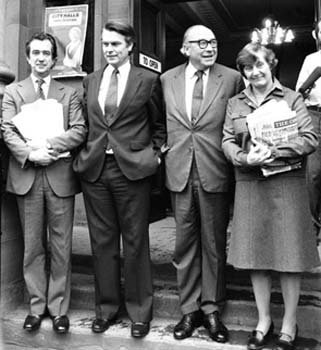 I see Clare Short is going to 'campaign' for a hung parliament: how do you do that? Campaign for people to vote in precisely the right amounts to produce this result? Not possible I would have thought. But the idea is a good one from one point of view. If the polls are right and the Conservatives become the largest party, then Labour's time in power is probably over. But there is a way to hang on to power that Gordon-assuming he's the new leader- might consider if the polls look dodgy.
I see Clare Short is going to 'campaign' for a hung parliament: how do you do that? Campaign for people to vote in precisely the right amounts to produce this result? Not possible I would have thought. But the idea is a good one from one point of view. If the polls are right and the Conservatives become the largest party, then Labour's time in power is probably over. But there is a way to hang on to power that Gordon-assuming he's the new leader- might consider if the polls look dodgy. Introduce proportional representation, as Lord Jenkins suggested way back in 1998(pictured with his fellow members of the Gang of Four)and do a deal with the Lib Dems to rule in coalition. As Labour would almost certainly be the biggest party, the top job plus most of the government portfolios would be theirs. If accused of cynical opportunism, Gordon could always explain that he has always supported this progressive reform and that it was Tony who vetoed it. Or he could just come clean and admit it was the only way left of staying on as PM after the election and he sure as hell wasn't going to pass it by.
Terrorism Threats to West are not 'Nonsense'
 Readers of this blog will know I rate Simon Jenkins as the most thoughtful and provocative of our British columnists but I'm not sure I agree with yesterday's offering. In it he argued that the terrorist threat had been hugely exaggerated, that you could not compare it to those which had occasioned either the Second World war or the Cold War. He deems the Bush-Blair casting of a dire terrorist threat to the western way of life to be self serving 'nonsense'. 'Most western countries' he writes, 'are healthy democracies with entrenched democracies, near invulnerable to military attack.'
Readers of this blog will know I rate Simon Jenkins as the most thoughtful and provocative of our British columnists but I'm not sure I agree with yesterday's offering. In it he argued that the terrorist threat had been hugely exaggerated, that you could not compare it to those which had occasioned either the Second World war or the Cold War. He deems the Bush-Blair casting of a dire terrorist threat to the western way of life to be self serving 'nonsense'. 'Most western countries' he writes, 'are healthy democracies with entrenched democracies, near invulnerable to military attack.'I wish I could see it like this as I think Jenkins displays amazing complacency on this issue. I agree with the point about Hitler and Stalin and I agree that, had Bush not over-reacted, bin Laden might well have lost the support he has subsequently garnered. But: we are not in a situation where the military tactics of either of these wars are of the slightest relevance; we went along with Bush, made the mistake, along with many others, and now face a threat which is very far from being 'nonsense'. The recent Channel 4 programme on The Cult of the Suicide Bomber, exposed the existence of unknown numbers of young Muslims being nurtured by religious extremists to self-sacrifice for their Muslim brothers via the insanity of killing themselves along with as many other members of the 'decadent west' as they can manage.
And their ranks are being swelled all the time, from within the UK and from without as jihadists return from the 'frontline' in Iraq and elsewhere. There are minorities of varying sizes in most European countries which all seem prey to these horrific teachings and we know from opinion polls that they command a worrying amount of sympathy within their respective communities. If well integrated young men from Leeds, who loved soccer and playing cricket as well as their own families and children, can morph into people who walk into the Tube stacked with deadly explosives and intent on mass murder, then we do have real reasons for concern. [The awful irony of the 7-7 bombrs is that the social club which harboured their transition from citizens to terrorists was funded by the council tax payers of Leeds.]
In Northern Ireland only small numbers of young Catholics made this journey into terrorism and caused untold destruction and heartbreak for nearly half a century. I think this new kind of terrorist is just as potentially dangerous, the more so because they live ubiquitously in mainland UK. As I see it- and I really do hope I'm wrong- in our open liberal society, we are all too 'vulnerable' to a campaign which could overshadow anything inflicted on us by the IRA.
Wednesday, September 13, 2006
Brothers' Reaction Ungracious but Understandable
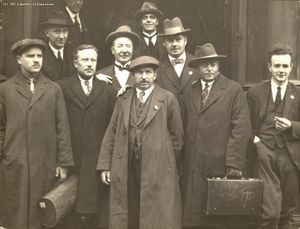 My picture shows members of the All Russian Federation of trade unions in the 1920s but the dowdy truculence of the people pictured seemed to reflect something of the spirit of yesterday[alright, I confess, I couldn't raise any pics of TUC on Google images]. From one point of view the brothers were as unfraternal as you could possibly imagine: the RMT walked out, the audience ensured Blair's jokes died on his lips, some sat staring straight ahead like zombies and his speech was scarcely applauded.
My picture shows members of the All Russian Federation of trade unions in the 1920s but the dowdy truculence of the people pictured seemed to reflect something of the spirit of yesterday[alright, I confess, I couldn't raise any pics of TUC on Google images]. From one point of view the brothers were as unfraternal as you could possibly imagine: the RMT walked out, the audience ensured Blair's jokes died on his lips, some sat staring straight ahead like zombies and his speech was scarcely applauded. And yet, this was the most successful leader in Labour history; since he has come to power he has done more for working peoples' material situation than anyone since the Attlee government: the minimum wage, year on year economic growth, money poured into public services, public sector hugely expanded. As Blair said, perhaps a bit too explicitly, millions of working people for the first time, could now afford a holiday abroad. It's some record.
And yet, one could understand the froideur. This has been the business friendly government in modern times. Blair has clung delighedly to the employment law half nelsons into which Thatcher had forced the unions. Because of their negative electoral effect in the past, Blair has regularly berated them and treated them with near contempt to prove to Middle England that he is not in their pocket. Trade union leaders have complained bitterly of how they have been excluded from Labour's inner counsels and they have attacked Blair's misguided foreign policy adventures. All this while they have provided much of the funding for the three election victories in 1997, 2001 and 2005. Blair is used to rousing his audience and sending them away with a happy tune to sing. This time the old trouper's magic failed. Sorry Tony, it was a crap gig, but you'll have to accept that this one was ruined in advance, substantially by your good self.
Tuesday, September 12, 2006
Cameron Establishes Clear Atlantic Water over Foreign Policy
 As far as voters are concerned, the Foreign Office is not normally central to their concerns. Sure, there was Suez and the Falklands, of course, which shouldered aside the usual central concerns of the economy and social services, but it's rare. So David Cameron's speech yesterday on this topic serves to indicate that we're in another of those rare situations when foreign policy might swing elections, whether devolved assembly ones or even the big one in 2009.
As far as voters are concerned, the Foreign Office is not normally central to their concerns. Sure, there was Suez and the Falklands, of course, which shouldered aside the usual central concerns of the economy and social services, but it's rare. So David Cameron's speech yesterday on this topic serves to indicate that we're in another of those rare situations when foreign policy might swing elections, whether devolved assembly ones or even the big one in 2009. After all, Iraq has been the stake which has driven through the heart of Blair's credibility as someone who can be trusted to speak the truth and make wise decisions. A BBC poll last night showed 55 per cent of the public think we are too closely aligned with US foreign policy. Cameron had a subtle job to do in keeping onside the blindly pro USA wing of his party, symbolised by the Lady herself at a White House do yesterday, while exposing a fair bit of clear Atlantic water between himself and a president whose ratings are even more in free-fall than poor old Tony's. His speech was essentially an attack on US-UK foreign policy which he criticised as 'simplistic' and lacking in 'patience and humility'. He urged a return to more traditional practices of recognizing the complexity of foreign affairs- not the Manichean black and white of Bush and Blair. He advised less forcing of democracy on countries, more multilaterlism and a maintenance of moral authority.
Our fellow blogger Guido notes that Cameron's five principles for foreign policy were lifted almost verbatim from Francis Fukayama's After the Neocons, but that's no crime if it eventually helps this country sever Blair's disastrous love affair with George Bush. What I would like to hear now, is what Gordon thinks about foreign policy. He's toed the line officially but he's going to find it much harder than Cameron to establish that distance which will before too long might have vital electoral significance.
Monday, September 11, 2006
The Rottweiler who hasn't barked

One of the curious aspects of the recent unseemly attempted 'coup' has been the absence of possibly the most combative politician in the Labour Party: John Reid, the Home Secretary. I have long argued he has ambitions for the top job; as we saw during the August air terror scare, he loves being in charge. I wasn't the only one to suggest he'd also love to poke Gordon- an old foe from the days when Scottish Labour politics resembled a suburb of Baghdad- in the eye as painfully as possible.
However, he has been wholly absent from the recent fracas, leaving all the heavy lifting in the fight to Charles Clarke [incidentally, I read in one of the Sundays that the former Home Secretary's outburst against Brown might have been preceded by a 'good lunch'- such is the big man's reputation].
Of course he's been on holiday but for someone as ambitious as Reid, it's odd he failed to cut short his summer sojourn and race home for his knuckle dusters. Maybe he calculated he had more to gain by standing aside and above the fray; but this would lead, as it has, to his name being sidelined as a candidate. Alan Johnson is currently the only real candidate in town. Maybe he thinks he can descend from above the scene of bloody destruction and appear as the much needed voice of reasoned calm who will lead Labour back into winning ways. Whatever the reason, this is the longest silence from him that I can ever recall since he entered the top flight of politics.
Sunday, September 10, 2006
Brown and 'Parkinson's Law'
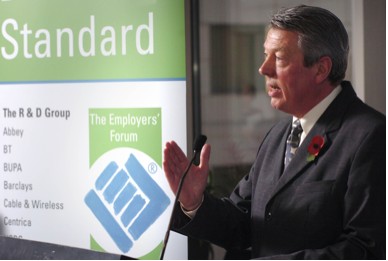 I once talked to Cecil Parkinson for a research project I am still to write up(memo to self- 'get on with it!')in which he spoke of his 'Parkinson's Law'. Not the one about work expanding to fill the time available, but his own personal one: 'The people are prepared to give you what you deserve, but not what you want.' It's quite good -probably culled from his own career where his grasp arguably exceeded his reach- but it now seems to be wonderfully applicable to Gordon Brown. In his interview with Andrew Marr this morning Brown did his best, as Ann McElvoy put it 'to appear as a normal human being'. But I felt he was being disingenuous for much of the time.
I once talked to Cecil Parkinson for a research project I am still to write up(memo to self- 'get on with it!')in which he spoke of his 'Parkinson's Law'. Not the one about work expanding to fill the time available, but his own personal one: 'The people are prepared to give you what you deserve, but not what you want.' It's quite good -probably culled from his own career where his grasp arguably exceeded his reach- but it now seems to be wonderfully applicable to Gordon Brown. In his interview with Andrew Marr this morning Brown did his best, as Ann McElvoy put it 'to appear as a normal human being'. But I felt he was being disingenuous for much of the time. He denied having anything to do with the attempted 'coup' but as shrewd newsmen piece together the anatomy of Labour's worst week since they came into power, events seem too choreographed; how come, for example, that the resigning PPSs did so at such regular intervals last Wednesday? This must have been pre-arranged. And the news that Tom Watson, a major Brown buddy, actually visited Brown's home 24 hours before the letter was sent, suggests Brown was in the know and gave his support, even if only tacitly. Watson arrived, it was claimed, to deliver presents to to the newly arrived baby- oh yeah....? Brown admitted being aware only of 'speculation and rumour' regarding the letter. I'm sure it was more than that. He also claimed he spoke out against the letter which sparked off the implosion but I assume he meant behind the scenes which, as he knows, is scarcely what was needed.
No, we have to accept now that Brown, though maybe not the author of the plot, was a party to it and a keen supporter to boot. However I think I accept his explanation that his 'grin of triumph' was merely the result of an aside to his aide Sue Nye and was related to his new son. It's ironic that a man who is accused of not smiling enough, should be accused of triumphalism when he does manage to crack his face into one. But the biggest irony of the week is that Brown has been damaged more than Blair by the end of it. By attracting the fire of Blairites and non Blairites alike for his suspect skulduggery, he now faces a contest which he might have avoided plus the taint on his character which his behaviour has earned. The worst effect of this has been that he has confirmed so many doubts which former ministers, Labour MPs as well as party activists have long harboured.
As I mentioned yesterday, I now think Alan Johnson is well placed to run Brown a close second, if not actually defeat him. Frontrunners in leadership contests have a habit of not winning- think Ken Clarke, think David Davis. Also think John Major, a little known minister with an unorthodox but interesting socio-political provenance and a virtual tabula rasa of a political position who emerged out of the political background to lift the crown. Johnson offers similar credentials and in addition carries none of the baggage of new Labour's mistakes. He could become prime minister and give the impression, as Major did, of providing a completely new government. If all elements of the party cotton onto that, Johnson could be catapulted into the top job with acclaim.
He may be hesitating whether to stand right now but I'm virtually certain the realization that the iron is hot and ready for him to strike will in the end prove irrestistible. After all, he is a politician. Returning to 'Parkinson's Law', Brown's had what he deserved; he may find that he is denied what he most dearly, and desperately, wants.
Saturday, September 09, 2006
Clarke shafting of Brown will benefit Johnson
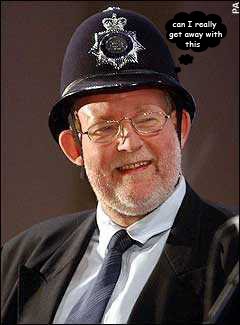 In my last post I wondered if it had been 'sorted'; a couple of days later it would seem the answer is definitely 'not at all'. My suggestion that Gordon had overplayed his hand proved more or less correct as his behaviour served to unleash some vitriolic attacks which cannot have done him any good at all. The most spirited and focussed intervention over the last few days came from Tony Wright, Chair of the Public Administration Committee, who pointed out that Gordon really had not got such a bad deal- strong possibility of becoming prime minister within a year and, assuming things go well, for another term as well. He urged Gordon to 'earn his inheritance' by showing leadership qualities and helping to stablize the party.
In my last post I wondered if it had been 'sorted'; a couple of days later it would seem the answer is definitely 'not at all'. My suggestion that Gordon had overplayed his hand proved more or less correct as his behaviour served to unleash some vitriolic attacks which cannot have done him any good at all. The most spirited and focussed intervention over the last few days came from Tony Wright, Chair of the Public Administration Committee, who pointed out that Gordon really had not got such a bad deal- strong possibility of becoming prime minister within a year and, assuming things go well, for another term as well. He urged Gordon to 'earn his inheritance' by showing leadership qualities and helping to stablize the party. Various other people have used this opportunity to settle old scores with the curmudgeonly Scot, including Frank Dobson and Charles Clarke, pictured looking like the overweight policeman we came to know but not love when Home Secretary. He it was who delivered the sharpest rebukes to a man with whom he has had many tussles but of whom, unlike many other of his colleagues, he had never been afraid. In the Daily Telegraph today he delivers a swingeing attack, seriously questioning whether Brown has the qualities to become an effective premier. He also calls him 'stupid' for displaying that gloating grin coming out of Downing St after meeting Blair as well as being a 'deluded control freak'. In his view Blair would never endorse him as prime ministerial material.
There is something to say in support of this view. Just watching the statements by Blair and Brown, it is obvious Blair has a lightness of touch and an ability to defuse tension with humourous self deprecation which Brown could never match. Blair's apology for bringing a 'friend' along to one meeting- Alan Johnson- followed by the quip, 'he is my only friend'. was a perfect example of a wit to which we Brits warm. We also learn from several sources that Brown hates to be challenged- hence his fury at the suggestion by Byers that inheritance tax be abolished; as a financial proposal Brown saw this a Blair inspired attack, instead of a legitimate suggestion which has already been implemented in Sweden. Being so sensitive to criticism is not a quality compatible with successful leadership and bodes ill for his chances of achieving much even if he does become leader.
And this is now in doubt too. Alan Johnson, the likeable, very popular Education Minister, has perfect credentials for the leadership: a trade unionist who is quintessentially English not Scottish and who can laugh at himself he probably has as many, if not more, friends as Gordon has enemies. And he has a brilliant additional aspect of his biography: his drunken father left him at 8, his mother died when he was 12 and he was brought up by his sister, leaving school without qualifications. But evne better, this classic desperately hard childhood took place in Notting Hill, the location of a Consersative set led by someone who received an infinitely better start in life. Combine all this with the fact that Johnson refuses to say he won't stand for the leadership and there are grounds to expect the odds on him shorten rapidly in the next few months.
Thursday, September 07, 2006
Has it Been Sorted or has it Not Been Sorted?
I'm away for a day or to but, before leaving, wanted to post a few thoughts on the events of today. Brown's statement was typically charmless and said more by what it left unsaid. Tony's statement was curious: at once admonitory to his party ('you shouldn't be doing this, you know') and unflinching('if you think I'm going to go easily, be a pushover, you can eff off'). It seems obvious little has been settled between the two men except-as in the failing marriage their relationship inevitably resembles- for an agreement to try and struggle on for a bit longer and for both to try and cool their respective ranks. Just whether they have their private armies properly under their control is a highly relevant question.
I suspect large elements of the rebel factions in Wales and Scotland and some marginal consituencies, are wondering why they marched themselves so bravely to the top of the hill, only to find themselves back down at the bottom, no better off. As Michael Brown of the Indy said on BBC 24, it all depends now on what the Blairite rebels think; if the likes of Bryant and Simon are satisfied, then Blair's position will be alright for the present; but if not, not. Blair clearly has tried to repair the damage by giving as little away as possible- it remains to be seen if the actions of Brown and Blair today are not just another dose of too little too late. Another barometer of the party will be whether Islington Labour Party withdraws its motion at the forthcoming conference calling on Blair to stand down. The word I fear is still: stand by for more fireworks at Manchester.
I suspect large elements of the rebel factions in Wales and Scotland and some marginal consituencies, are wondering why they marched themselves so bravely to the top of the hill, only to find themselves back down at the bottom, no better off. As Michael Brown of the Indy said on BBC 24, it all depends now on what the Blairite rebels think; if the likes of Bryant and Simon are satisfied, then Blair's position will be alright for the present; but if not, not. Blair clearly has tried to repair the damage by giving as little away as possible- it remains to be seen if the actions of Brown and Blair today are not just another dose of too little too late. Another barometer of the party will be whether Islington Labour Party withdraws its motion at the forthcoming conference calling on Blair to stand down. The word I fear is still: stand by for more fireworks at Manchester.
Is it a Coup or not a Coup?


So, it's started. Read the reports of the action and you have to believe Polly Toynbee's diagnosis of civil war is close to being on the money. It reminds me so much of the drama that was late November 1990 when Maggie met her end. It's hard to say she was toppled by a coup- many insist she was though surely what happened was not coordinated?- but are we witnessing a coup here? Toynbee quotes a senior Blair aide as insisting that we are, going on to cite the connections between Tom Watson and Brown as well as the letter signatories and ties back to Brown. To cap it all, he claimed, close Brown ally Doug Henderson had set up a TV crew in his garden to enable him to call for Blair to go by next spring in the wake of the resignation announcements. I saw one of the resigners, Khalid Mahmood, on Newsnight deny any contact with Brown and just about believed him. We'll have to wait a long time to discover the real story I'm sure but a couple of things from yesterday what provide pointers.
Firstly Brown has clearly taken the gloves off. We learn that he met Blair twice yesterday and that the air was thick with rancour with Brown accusing Blair of 'blackmail' and worse and Blair responding in kind. Secondly, Brown did not emerge to repudiate any of the criticisms of Blair or utter a word in his defence; his silence was the most eloquent aspect of what Patrick Wintour called the 'most astonishing day in the annals of New Labour'. But does standing back and not helping a rival under attack constitute orchestrating a coup? It's a nice debating point.
It now seems clear Blair misjudged the depth of revulsion in the PLP to his Bushalike Lebanon policy. This discontent seemed to be invested with all the other frustrations caused in recent months combined with appalling poll figures suggesting Labour might lose the next election. Blair could and should have moved more surely to defuse the looming crisis instead of assuming a lofty refusal to compromise would still the disquiet. Now he risks reaping the whirlwind and a situation wholly out of his control.
That wonderful old loyalist, Gerald Kaufman, speaks up for the cause by recalling the depths from which Blair raised up the defeated party of 1992 and emphasizing its achievements. He is right, of course, but he seems to have forgotten Iraq and the Lebanon and the damage Blair's obsession with aping Bush have inflicted on the party. Blair got away with it by ignoring calls from his won party but now is paying the price. Other loyal voices will join him over the next few days and there is still much to play for. But as so many commentators are now saying the damage to Labour's future prospects could prove woefully longterm. As a political junkie, I love the drama but as a Labour Party member, I do rather despair.
I'm just beginning to suspect also, that Brown might be overplaying his hand. According to Blairites, Brown demanded public endorsement of his candidacy from Blair as well as a 'repudiation of the idea of a fundamental debate about the Labour party's future'. That seems like a couple of demands too far and evokes a mood a bit too much like his infant son in the picture above. The Guardian asks the question, why didn't Blair sack Brown? Surely he had been more 'disloyal, discourteous and wrong' as the junior minister Blair said he was in any case going to sack before he resigned? The truth is that Blair's position is now so tenuous that such a decisive blow against his bitter enemy would promptly bring about his own demise.
Wednesday, September 06, 2006
Blair Offers Too Little Too Late
 Seems like the message is seeping through but not enough and not fast enough to satisfy the critics. And who are the critics? The usual supects of embittered exministers and unreconstructed Old Labourites? Not at all. Yesterday's letter came from loyal Blairites Chris Bryant and Sion Simon plus six bottom rung junior ministers whose ambitious loyalty would normally be beyond question.
Seems like the message is seeping through but not enough and not fast enough to satisfy the critics. And who are the critics? The usual supects of embittered exministers and unreconstructed Old Labourites? Not at all. Yesterday's letter came from loyal Blairites Chris Bryant and Sion Simon plus six bottom rung junior ministers whose ambitious loyalty would normally be beyond question. Blair seems to have responded indirectly but as Tony (Baldrick) Robinson said on Breakfast Television this morning, his colleagues in the party and supporters in the country, deserve more than a hint to a junior member of the Cabinet about no more than a year and a possibly leaked comment to the tabloids of 31st May. There is acute concern at the way Labour's national support is going pear-shaped. MPs in marginal constituencies have lost patience but even more concerned are the Labour members of the Scottish Parliament and Welsh Assembly. They are due to face the voters next May and the end of that month is too distant to improve their already dire chances of being returned. And I'm not even mentioning local councillors who will face the election axe even before then. Blair in power for another year is too long a period to extend the suffering; if Labour support is an egg-timer, we are looking at an upper chamber where the sand seems to be draining away at an exponential rate.
What sticks in the craw of Labour supporters like me is the apparently dismissive attitude of the leadership. Tom Watson sent him a letter refusing to withdraw his name from the Bryant letter and resigning from his junior post; Blair's spiteful response that he was going to sack him anyway was nothing short of pathetic. We are not talking about a single proposal, let alone a policy, we are talking about the party's raison d'etre- its chances of beating the Conservatives in 2009. I'm no great fan of the Chancellor but accept the near inevitability of his accession and believe he has a chance, with a fair wind, of re-gaining some of the acres of ground lost by Blair's crazy determination to hitch his wagon to Bush's (on which see here). The current situation reminds me a bit of Black Wednesday back nearly 14 years ago. Major responded to the run on the pound by hoisting interest rates but it was too little too late and the tsunami of speculative money swept away the Bank of England's feeble defences. Blair has been sent the message and has issued merely a batsqueak of a reply... It's not good enough. As everyone knows, our constitution gives our Prime Ministers unfettered power only so long as they can command their troops in the Commons.
The Guardian's front page review today records the Bryant-Simon letter plus the one signed by 60 MPs welcoming Miliband's 'clarification'. Of more interest to me, however, was the (rumoured)imminent letter reflecting;
'much broader cross party support being drafted... expected to demand that Mr Blair either leave now, or before the the Welsh and Scotish elections.'
The Guardian's Patrick Wintour suggests:
'At least 80 MPs are prepared to go public over this letter, though some others will refuse to declare themselves.'
Now when that letter arrives Blair will have to come up with something better. As his enemies queue up with sharpened knives, the tipping point has proably now been reached.
Tuesday, September 05, 2006
Blair's Farewell Gig Will Rival Sinatra's

 What strange political chemistry is it which makes aides assume, by proxy, so much of their bosses' identity and interests? People like the pictured Gould and Jonathan Powell (Blair's pollster and chief of staff respectively) seem not to just work for their political master but live an alternative life for him. We saw way back in the early days how Charlie Whelan did the same for Gordon Brown and how it is the aides and spinners, rather than the principals themselves, who keep feuds boiling between senior Cabinet members.
What strange political chemistry is it which makes aides assume, by proxy, so much of their bosses' identity and interests? People like the pictured Gould and Jonathan Powell (Blair's pollster and chief of staff respectively) seem not to just work for their political master but live an alternative life for him. We saw way back in the early days how Charlie Whelan did the same for Gordon Brown and how it is the aides and spinners, rather than the principals themselves, who keep feuds boiling between senior Cabinet members.But today we see a new manifestation of this devotion- the plans of Tony's aides for his bowing out of British politics. And what a glorious, extended bow it is going to be. Thanks to the Daily Mirror we have an insight into what is being planned. According to a leaked memo his aides feel 'His genuine legacy is not the delivery of policy but the triumph of Blairism'. Well, that's not such a bad start actually. Since the multiple cock-ups over foreign prisoners, NHS computers, EU pay-outs to farmers we are only too aware that delivery does not quite add up to an especially impressive set of trophies in the cupboard. And it's also true that defeating the basic tenets of Thatcherism- albeit after embracing a fair number of them- is probably going to be his chief legacy in the eyes of history. And that is no mean thing to have pulled off as I've opined in earlier posts.
But it's the idea of a national celebration entailing a nationwide tour and carefully choreographed media appearances on the likes of Blue Peter and the Chris Evans radio show which raise a different set of questions. Consider this line:
'He needs to go with the crowds wanting more. He should be the star who who won't even play that last encore'
Are they properly sane? Do they not realise how low Blair has sunk in the nation's regard? How Iraq is more than just the 'elephant in the room', but something which Blair will never live down.
A discreet leaving the stage would be more appropriate than this planned, toe-curling Gotterdamerung lap of honour. The aides who wrote the memo finish off with the rhetorical questions: 'Most importantly-are we up for it? Is TB up for it?' Boys and girls in Number 10, the former, it would seem, goes without saying, but on the latter I suggest you check first because, if he has any sense, he won't be.
Monday, September 04, 2006
Do Off Shore Tax Havens Make us Corrupt?
 According to John Christensen, director of the Tax Justice Network, speaking yesterday at an academic conference, Switzerland, the USA and the UK are among the world's most corrupt countries. Actually he goes futher than that: he declares these countries 'as corrupt as the worst African states'. The reason for this surprising accusation is the protection such countries provide for off shore tax havens which enable the richest corporations and individuals in the world to avoid paying tax on their profits and income. The accuser should know of what he speaks as he was once the adviser to the government of one of the UK's premier tax havens: Jersey.
According to John Christensen, director of the Tax Justice Network, speaking yesterday at an academic conference, Switzerland, the USA and the UK are among the world's most corrupt countries. Actually he goes futher than that: he declares these countries 'as corrupt as the worst African states'. The reason for this surprising accusation is the protection such countries provide for off shore tax havens which enable the richest corporations and individuals in the world to avoid paying tax on their profits and income. The accuser should know of what he speaks as he was once the adviser to the government of one of the UK's premier tax havens: Jersey. It may seem odd to bracket this practice along with money laundering and taking bribes but the argument is that such devices enable the rich illegitimately to keep money which they should be delivering up to help pay for schools, hospitals and the like from which everyone benefits, including the rich themselves plus their families. Mr Christensen claims that by stealth the global economy had been moulded to suit the interests of the super-rich who now salt away their billions off shore in Jersey, the Isle of Man, Switzerland, Monaco and the Cayman Islands.
'They live more or less where they choose and their main preoccupation lies in staying rich. Detached from the concept and practice of citizenship, they have managed to relieve themselves, to a remarkable extent of the obligation to contribute to the national treasury.'
Moreover these powerful countries do their best to prevent any collective action being taken against such flagrant evasion, either by the EU or national governments. Labour criticised the Conservatives for facilitating conditions so favourable to the rich but once in power have done nothing to close them down. Indeed, Gordon Brown has maintained such a lax regime that mega-rich foreigners like Hans Rausing, the Tetra-Pak billionaire enjoys his fabulous lifestyle in Wadhurst, East Sussex, rather than his native Sweden where the tax regime is so very severe - but public services are probably the best in the world, paid for not by Rausing but his fellow Swedes.
Some economists claim the UK reaps advantage from the presence of the uber-rich on our shores but I've yet to be convinced of benefit to anyone but the plutocrats themselves. Finally, there was quite a furore recently about Cabinet member, Tessa Jowell's husband, David Mills regarding his involvement with Silvio Berlusconi. His job, it transpired, lies in arranging such tax havens the super-rich, enabling them to evade the obligations everyone else has to honour. Is it fair to call this 'corruption'? You decide.
Sunday, September 03, 2006
Blair's refusal to step down could blight Labour's future generation of leaders
 In the Observer today Ed Balls explains why he thinks the current transition of power can 'confound the history books' by being smooth. He points out that the economy is strong- a condition not there for Major, for example, and that the party is not racked by divisions on principle or ideology. We can accept his assurances on the economy- though a few cassandra voices question how sound it really is- but the party is surely split on one major question- is Tony Blair's remaining in power of any advantage to the future of the Labour government?
In the Observer today Ed Balls explains why he thinks the current transition of power can 'confound the history books' by being smooth. He points out that the economy is strong- a condition not there for Major, for example, and that the party is not racked by divisions on principle or ideology. We can accept his assurances on the economy- though a few cassandra voices question how sound it really is- but the party is surely split on one major question- is Tony Blair's remaining in power of any advantage to the future of the Labour government? The Observer piece by Andrew Rawnsley today discusses the tenuousness of Blair's position while Martin Kettle in yesterday's Guardian suggested that if a 'renewal debate' is necessary for the party to continue in office and have a chance of winning in 2009, it might be best to have it in Blair's valedictory year. His reasoning is that during Brown's initial period in office he will wish to stamp his authority on the party and, if anything, rein in debate.
But it seems to me the most important voices on Labour's future are not those Blairites and Brownites who have vested interest in how long Tony stays or how soon Gordon arrives, but those of the next generation of party leaders, people like (the pictured) David Miliband or indeed, Ed Balls himself. They are the people who might have to sit out a long period of opposition if this transition goes pear-shaped and who, along with the less well- off nationwide, who have most to lose if, in the process, it deracinates Labour support for a generation or more.
Meanwhile I'm concerned that Blair seems to be planning to stay for a whole further year. The plummetting polls show how much damage his period at the helm has inflicted since his 2005 far from emphatic election victory. The Sunday Times' leader suggests Bair wants to leave on a 'political high' that Blair wants to leave on a high with his foreign policy looking hopeful and public services well on the way to being modernized successfully.
My fear is that this idea is as ephemeral as the blond highlights currently illuminating Blair's thinning hair. Iraq and Afghanistan are more likely, I'd venture, to become even more disastrous rather than less so a year hence and I have no faith that what often appears to be the terminal inefficiency of government under Blair will magically turn around between now and his assumed departure in a year's time.
And here's another suspicion I harbour: his determination to scupper Brown's chances will lead him to stay on even longer than a single year and that in the process politicians like Miliband, the hope of the future, will end up being chained to the opposition benches for most of their lives.
Saturday, September 02, 2006
Could Sir David's letter lever Blair away from Bush?
 Sir David Manning was educated at Oxford, John Hopkins and Bologna and has served in Israel, India and Moscow. So he had been around a bit even before rising to become Blair's highest level foreign policy adviser after the 9-11 attacks. So it was interesting to read that such a trusted aide, saturated in the Whitehall traditions of discretion and understatement, should have sent a 'devastating' letter to his prime minister from his new perch as ambassador in Washington- Foreign Ofice threats to seek an injunction against publication suggest the letter is genuine. In it, we are told, Sir David 'passionately' attacked Blair's foreign policy stance over the Lebanon War.
Sir David Manning was educated at Oxford, John Hopkins and Bologna and has served in Israel, India and Moscow. So he had been around a bit even before rising to become Blair's highest level foreign policy adviser after the 9-11 attacks. So it was interesting to read that such a trusted aide, saturated in the Whitehall traditions of discretion and understatement, should have sent a 'devastating' letter to his prime minister from his new perch as ambassador in Washington- Foreign Ofice threats to seek an injunction against publication suggest the letter is genuine. In it, we are told, Sir David 'passionately' attacked Blair's foreign policy stance over the Lebanon War. 'It had a huge impact in Downing St' according to a source quoted by The Times, and in response the PM 'shifted quickly fom solid support of President Bush...to calling for an urgent ceasefire.' We learn Blair now plans a peace mission to the Middle East in an effort to rehabilitate his image one of the world's premier peace negotiaters. It's worth recalling that Tony offered such a mission to Bush in that infamous 'Yo Blair' episode but was abruptly rebuffed.
This is more bad news to load on to the problems he will face at Manchester in a fortnight's time but it offers two hopeful signs to those who have become so exasperated with the man. Firstly, it shows he can and does listen to criticism and adjust policy accordingly. And secondly this might be the first,long awaited sign that Blair is no longer in thrall to the man in the White House who has cast such a malign shadow over his recent career. Now that really would help him at Manchester. But, given the alleged fate of Jack Straw when he began to distance himself from US foreign policy, Sir David might just find his boss coming under pressure from Washington to find another billet for an adviser who is just that little too outspoken.
Friday, September 01, 2006
'Mending' of Ozone Hole Provides Glimpse of Hope
 Political news is so laden with misery, it's surprising more of those of us who are obsessed with it aren't on anti-depressants, but there has been one bright spot at the very least in recent weeks. Remember the ozone hole? We were quite worried about it during the eighties when worldwide concern about the environment first kicked off. Chemicals-CFCs- used in aerosols and fridges,were combining with other chemicals in the upper atmosphere to cause depletion of the layer of ozone which filters out harmful radiation from the sun. Scientists warned that unless there was remedial international action, skin cancers would increase vastly plus eye cataracts as well as harm to crop yields and sea life.
Political news is so laden with misery, it's surprising more of those of us who are obsessed with it aren't on anti-depressants, but there has been one bright spot at the very least in recent weeks. Remember the ozone hole? We were quite worried about it during the eighties when worldwide concern about the environment first kicked off. Chemicals-CFCs- used in aerosols and fridges,were combining with other chemicals in the upper atmosphere to cause depletion of the layer of ozone which filters out harmful radiation from the sun. Scientists warned that unless there was remedial international action, skin cancers would increase vastly plus eye cataracts as well as harm to crop yields and sea life. In 1987 the Montreal Protocol committed signatories to ban ozone-harmful products; sceptics doubted its efficacy but the invention of a substitute (HFCF-22) aided the process and now UN agences tell us that the ozone layer is on the mend with recovery for most of the world likely by 2050 and the more problematic Antarctic region by 2065. Amazing. An example of international cooperation that has genuinely worked. And reason to hope, maybe, that something similar can be managed regarding carbon emissions on the reductiuon of which David Cameron wants the goverment to commit itself via legislation.
But this is a much taller order as the reductions required entail three major changes:
i) consumer restrictions of travel and lifestyles to which the developed world has become jealously addicted and the developing world is fast learning to be;
ii)an attitude sea change by George Bush and his oil lobby cronies/advisers;
iii) much more radical technological innovations than we have seen to date, plus their worldwide adoption.
With warming speeding up and CO2 beginning to escape from massive tracts of permafrosted land in Asia, the achievement of any one of the above by an increasingly anarchic world seems remote chance from where we are now but at least the Ozone Hole success gives us some reason to hope.



